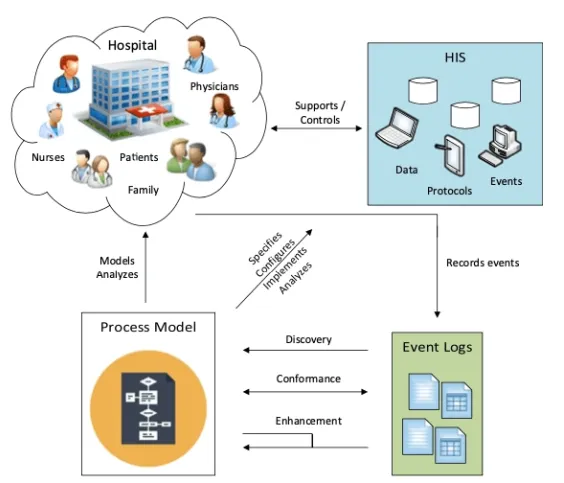Abstract
Healthcare is in crisis, crippled by inefficiencies. This white paper pulls back the curtain on this hidden epidemic, exposing the distressing cost of broken processes and the financial toll it takes on the entire system, offering a data-driven lifeline: process intelligence.
Imagine this familiar scene: a bustling hospital emergency room overflowing with patients seeking urgent medical care. A child with a high-grade fever whimpers in their mother's arms, an elderly person clutches their chest in discomfort, and a young athlete winces in pain with a sprained ankle. Behind the scenes, a team of extremely dedicated healthcare professionals, including doctors, nurses, and medical assistants, works tirelessly to provide the best possible care. Their dedication is unwavering, yet despite their best efforts, delays and inefficiencies often plague the system, leaving patients feeling frustrated and invisible.
We are all keenly aware, either personally or through the experiences of our loved ones, of the agonizing wait, the debilitating pain, and the feeling of being just another face in a sea of suffering. These experiences erode trust and leave a lasting impact on patients and their families, highlighting the urgent need for change.
When Processes Fail, Patients Suffer
But what if I told you there's a way to fix this narrative? A way to alleviate the cost of inefficiency and empower health systems to deliver effective care? This potential for change is not just a distant idea but a tangible reality we can work towards.
Vee Healthtek, working closely with many leading health systems nationwide, has witnessed the complexity of hospital operations firsthand. Each resembles a complex symphony, consisting of an intricate network of countless interconnected processes struggling to harmonize to deliver patient care.
A Symphony of Suffering: Inefficiency's Toll on Patient Care
The current system, burdened by manual workflows and fragmented processes, resembles an orchestra struggling to maintain its tempo. These processes are vulnerable to errors, delays, and miscommunications, particularly as patients navigate through various departments and care transitions. I've seen firsthand how a misplaced document or missed communication can cascade into hours of delay for a patient, adding unnecessary stress and suffering.
The consequences are significant: increased lengths of stay, suboptimal resource utilization, and potentially adverse events, all contributing to increased costs and diminished patient satisfaction.
The answer lies not in band-aid fixes but in a deeper solution: process intelligence, a surgical tool that dissects every healthcare process to act as a guiding light, illuminating various paths to streamlined operations.
Illuminating the Path: The Power of Process Intelligence
Think of this technology as a GPS for a hospital. It uses data-driven insights to map out every process within a health system. It's like having a real-time dashboard that reveals the hidden patterns and inefficiencies that often go unnoticed in the daily chaos of healthcare delivery. As a physician, I've often wondered where the bottlenecks are in patient care. Are patients waiting too long for test results? Are there delays in scheduling appointments? This approach can help answer these critical questions every health system currently faces, such as:
- Where are patients experiencing the longest wait times?
- Are there patterns in patient readmissions that can be addressed with proactive interventions?
- Which prior authorizations take longer than others to obtain?
- Are there variations in treatment plans that could impact patient outcomes?
- What is the average cost/time to collect payments from patients and insurers?
- Are there specific procedures & diagnoses associated with higher denial rates?
- Which physicians are consistently following best practices and who is in need of additional support/training?
- How can we improve communication between different departments within the hospital?
Process Mining vs. Process Intelligence:
A Deeper Dive
As a physician, AI enthusiast, and revenue cycle expert, I've seen the transformative power of data in healthcare. Yet, data alone is like a patient's past medical history - rich in detail yet lacking a clear diagnosis.
Process mining, like a medical scribe meticulously documenting patient records, reveals what happened during the patient journey. However, it fails to explain why those deviations occurred or what their implications might be.
On the other hand, this process intelligence is like a seasoned physician who understands the medical history as well as the underlying physiology and disease processes. It delves deeper into the data, uncovering the root causes of inefficiencies, predicting potential complications, recommending tailored treatment plans for improvement, and offering expert guidance on how to optimize the patient's care journey.
It's crucial to bridge the gap between raw data and actionable insights for healthcare leaders to make informed decisions to drive meaningful change. It's not merely about fixing individual issues; it's about optimizing the entire system.

Real-World Impact:
The Cleveland Clinic Case Study
According to the HealthWell Foundation, Cleveland Clinic incorporated elements of process intelligence by analyzing data from its electronic health records. It was able to identify inefficiencies in patient transfers from the emergency room to inpatient beds.
The results were impressive: a 22.8% decrease in ER wait times, a 10.7% decrease in wait times to see a provider, and an 8.9% increase in the time providers spent with patients. Streamlining the patient journey eased the burden on the emergency department while simultaneously enhancing the patient experience.
Beyond Efficiency: The Human Touch
Healthcare is not just about processes and procedures; it's about people. While this innovative solution can optimize operations, it's equally important to ensure that these improvements translate into a more compassionate and patient-centered experience.
Imagine a scenario where a patient with a chronic illness receives personalized care plans based on insights from this technology. The care team is able to anticipate their needs and provide timely interventions, all while minimizing delays in authorizations or providing medically unnecessary procedures.
This is the true power of process intelligence: to not only streamline healthcare delivery but also to enhance the human connection between patients and providers.
A Call for Action
In the face of rising costs, increasing patient volumes, and complex care needs, the status quo in healthcare is unsustainable. We have an obligation to evolve — to eliminate waste, reduce suffering, and maximize the value of every encounter.
This innovative solution is not just a tool for efficiency; it's a force for equity, empowering us to deliver the highest quality care to every patient while simultaneously streamlining hospital operations and transforming healthcare delivery from a reactive to a proactive model.
Process intelligence is the bridge between where we are and the future we envision for healthcare.
References:
HealthWell Foundation. (2013, August 15). Cleveland Clinic's Value-Based Care Team Improves Patient Wait Times, Saves Costs. HealthWell Foundation.
https://www.healthwellfoundation.org/realworldhealthcare/cleveland-clinics-value-based-care-team-improves-patient-wait-times-saves-costs/
Röglinger, M., van der Aalst, W. M. P., & Günther, C. W. (2012). Process Mining in Healthcare - A Literature Review (Image 1)
World Economic Forum. (2024, January 23). How to use process intelligence and AI to rewire businesses. World Economic Forum.
https://www.weforum.org/agenda/2024/01/process-intelligent-ai-rewire-business-sustainable-transformation/
Process Intelligence Research Group. (n.d.). Delft University of Technology.
https://www.pi-research.org/

